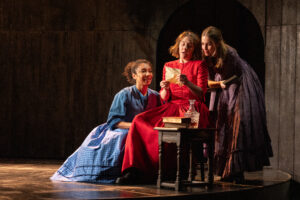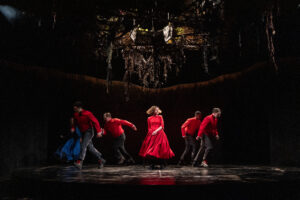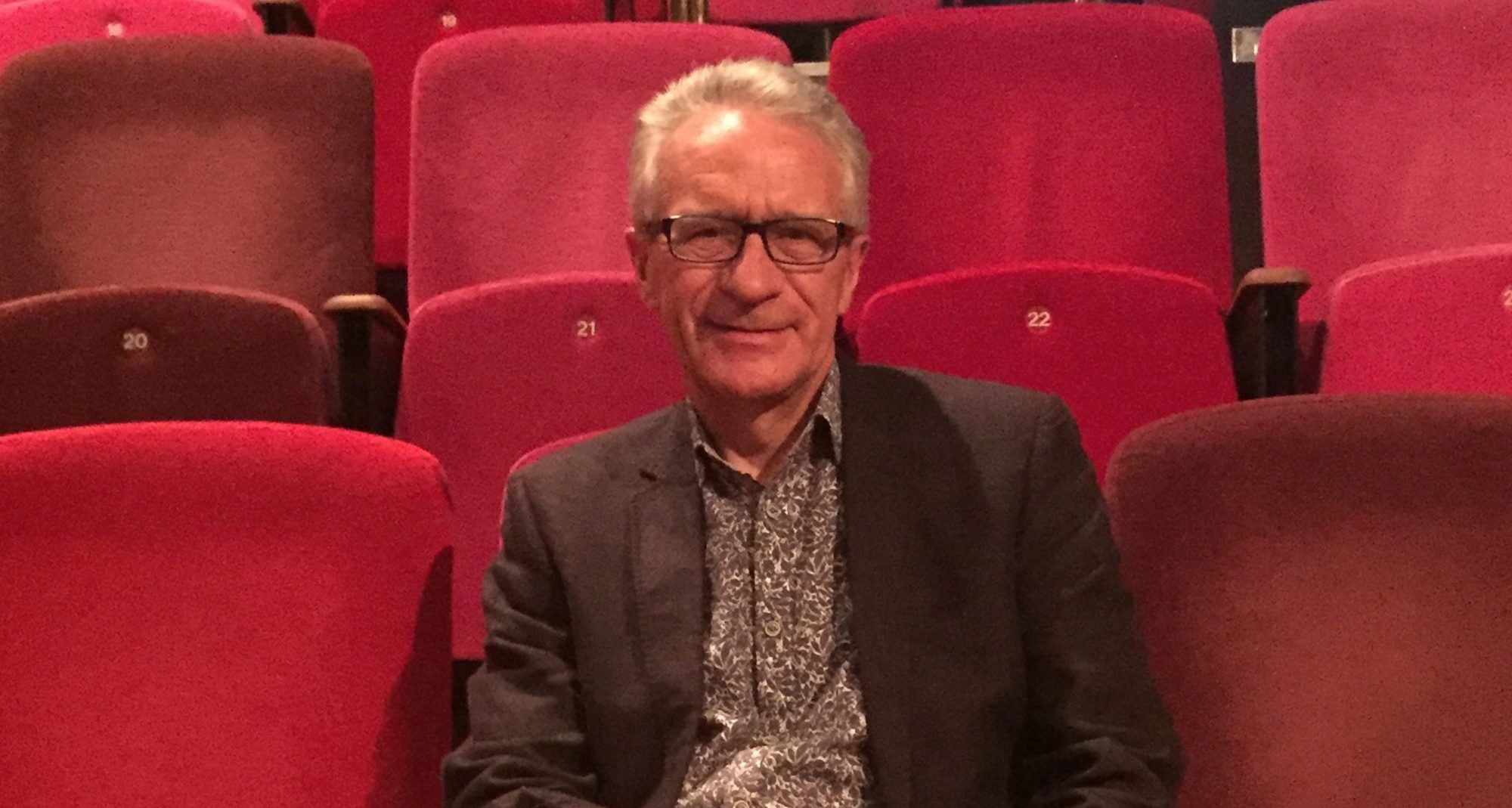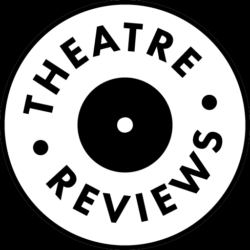Gemma Whelan is a winner in this romp through the lives of the Brontes
★★★

It might be better if you know nothing about the Brontës and simply watch Sarah Gordon’s play Underdog as a portrait of the competition and mutual support that often co-exist among sisters, and of the challenges of being a female novelist in early Victorian times. If you do know a bit about them, you may be annoyed at the liberties taken by this interpretation of their relationship. On the other hand, like me, you may find it jolly good fun. It certainly gains from having the mightily talented Gemma Whelan as Charlotte Brontë.
Let’s start with Ms Whelan. It’s only right, since she begins the play. She enters through the auditorium, chatting to audience members about the Brontë novels. Unexpectedly, for the author of one of those ‘dour’ books, she’s wearing a bright red dress. She goes up on stage and explains that we are going to hear her story.
As promised, Gemma Whelan and her character dominate the whole evening. She is cocky and nervous, knowing and naive, likeable and unpleasant, and very funny. Supported by Natalie Ibu’s sharp and speedy direction, she holds us- and her sisters- in her grip throughout the evening.
This is a good point to tell you about the set. I know we don’t buy tickets to see the design but Grace Smart’s is impressive. At the beginning, there is a thick carpet of moorland gorse and heather. Almost as soon as Charlotte has mounted the stage, this flies upwards until all we can see is the mass of brown roots underneath. Three black walls are revealed that, combined with the ceiling, represent wonderfully the claustrophobia and earthiness so often associated with the Brontë sisters.
One nice touch is the use of a revolve to indicate more frantic activity, or at the start of act two the long slow coach journey to London, complete with theatrical coconut shells clip-clopping. The set has one more surprise at the end of the play when the back opens up to indicate that Charlotte and the other Brontes are nowadays known to the whole world.
The Other Other Brontë of the title is not the middle sister Emily, who wrote Wuthering Heights. Emily’s character isn’t explored so deeply as the other two but then she was the most keen to preserve her anonymity and she died young. So less is known about her. That doesn’t stop Adele James making a good fist of playing a middle sister who challenges the elder and defends the younger.
No, the other other Brontë is the youngest sister Anne who wrote the less well known Agnes Grey and The Tenant Of Wildfell Hall. Anne is played by Rhiannon Clements with an excellent combination of inner strength and outer submissiveness.
The play suggests Charlotte was jealous of Anne’s talent, that she stole the premise of Agnes Grey for her own novel Jane Eyre, and that Anne let her eldest sister walk all over her. Charlotte waivers between undermining her youngest sister and giving her love and support. In fact, this is the greatest joy of Underdog, the way in which many sisters close in age are both competitive and supportive. (This subject has become almost a theme at the National lately, with the great Till The Stars Come Down, The House of Bernarda Alba and Dancing At Lughnasa all featuring sisterly rivalry and solidarity.)
There is a scene, where Charlotte confident of her work but not of her looks, is welcomed into London’s literary grandees’ club (shown as a kind of disco- just one of many amusing anachronisms). On a high because her talent has been recognised, she shrugs off Anne’s concerns. But when she is insulted for her lack of femininity, she turns desperately to her sisters for reassurance.
By the way, the sisters’ ‘coarseness’, which at that time was how many perceived their writing and therefore the women themselves, is given substance in the play by their use of modern expressions and a huge amount of swearing, all to great comic effect.
Liberty-taking, laughter-inducing

Here’s some of the historical background. Back in the first half of the 19th century, women novelists were expected to write romances set in polite society. It was unacceptable to many critics that novels that involved class discrimination, male violence, substance abuse and more, as the Brontes’ did, could be written, or read, by women. Therefore, all three sisters submitted their first novels to publishers under male pseudonyms, something Charlotte and Anne were keen to give up, but which Emily clung to.
Charlotte outlived her younger sisters. After their deaths, she did stop a reprint of Anne’s The Tenant of Wildfell Hall, despite its success. She also seems to have been the most determined among the three to gain respect in literary society, and worked with Elizabeth Gaskell to this end.
Sarah Gordon uses these facts to support a thesis that Charlotte was ambitious and competitive, while the other two were not, and that Charlotte pushed her own work at their expense. The reality may be different, but let’s not let the facts get in the way of a good story. And it is a good story, full of comedy and a little pathos, and some interesting ideas.
The many other parts are played by a small group of men, including Nick Blakeley as a snooty Elizabeth Gaskell, Julian Moore-Cook as the slimy publisher George Smith and James Phoon as the the Brontes’ troubled alcoholic brother Branwell.
Underdog is primarily about three sisters, and 19th century attitudes to women, but there is an undertow that questions how what we know or think we know about artists influences our appreciation of their art. However, apart from the boisterous relationship of the sisters, everything else is touched on lightly, and the main emphasis is on fun. Which it is.
Underdog can be seen at the National Theatre’s Dorfman studio until 25 May 2024.
Paul was given a review ticket by the theatre
Watch this review on the YouTube channel Theatre Reviews With Paul Seven

